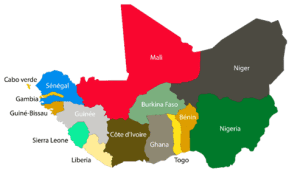TAG: GS 2: INTERNATIONAL RELATIONS
THE CONTEXT: The Economic Community of West African States (Ecowas) faces a significant upheaval as Niger, Mali, and Burkina Faso, all junta-led nations, declare their departure from the regional bloc.
EXPLANATION:
- This move comes after their suspension due to military coups, prompting tensions with Ecowas, which has been urging a return to democratic governance.
Sovereign Decision to Withdraw:
- In a joint statement broadcasted on state media, the three countries announced their withdrawal, describing it as a “sovereign decision.”
- They emphasized Ecowas’ deviation from its founding principles and Pan-African ideals, alleging influence by foreign powers and a failure to address the pressing issue of jihadist violence within their borders.
Founding Members’ Dissatisfaction:
- Niger, Mali, and Burkina Faso, founding members since Ecowas’ establishment in 1975, voiced their dissatisfaction, accusing the bloc of betraying its foundational principles.
- The joint statement portrayed Ecowas as a threat to member states and peoples, reflecting a broader discontent with the regional organization’s role and effectiveness.
Tensions Post-Military Coups:
- Relations between Ecowas and the three countries soured after military coups unfolded in Niger (2022), Burkina Faso (2022), and Mali (2020).
- The regional bloc consistently called for a return to civilian rule, heightening tensions as the junta-led nations resisted these calls.
Ecowas Response and Diplomacy:
- Ecowas responded to the withdrawal announcement, expressing its commitment to finding a negotiated solution.
- The bloc emphasized the three countries’ importance and insisted that it had not received formal notification about their withdrawal.
- Diplomatically, Ecowas faces the challenge of maintaining regional stability while addressing the concerns raised by the departing nations.
Formal Withdrawal Procedures:
- According to the Ecowas treaty, member states wishing to withdraw must provide written notice a year in advance and adhere to its provisions during that period.
- The formal withdrawal procedures raise questions about the legality and timing of the announced exit by Niger, Mali, and Burkina Faso.
Hardened Stance and Accusations:
- Despite suspension, sanctions, negotiations, and even threats of military intervention, the military leaders in the three nations have adopted a hardened stance.
- They accuse Ecowas of being influenced by external powers, distancing themselves from former colonial power France, strengthening ties with Russia, and forming The Alliance of Sahel States.
Security Concerns and Delayed Elections:
- The junta-led countries argue that their priority is to restore security before holding elections, citing challenges in containing jihadist insurgencies linked to al Qaeda and Islamic State.
- Niger seeks a transition period of up to three years, Mali delayed elections initially set for February, and Burkina Faso prioritizes the fight against insurgents over immediate elections.
Impacted Ecowas Delegation Meeting:
- A scheduled meeting between Ecowas and the junta in Niger faced disruption as the delegation’s aircraft developed technical problems, resulting in a postponement.
- The meeting aimed to discuss sanctions on Niger, further complicating the ongoing diplomatic efforts to address the political impasse.
ECOWAS
- The Heads of State and Government of fifteen West African Countries established the Economic Community of West African States (ECOWAS) when they signed the ECOWAS Treaty on the 28th of May 1975 in Lagos, Nigeria.
- The Treaty of Lagos was signed by the 15 Heads of State and government of Benin, Burkina Faso, Côte d’Ivoire, The Gambia, Ghana, Guinea, Guinea Bissau, Liberia, Mali, Mauritania, Niger, Nigeria, Sierra Leone, Sénégal and Togo, with its stated mission to promote economic integration across the region.
- The Senegalese President was represented by the Minister for Foreign Affairs.
- Cabo Verde joined the union in 1977.
- The only Arabic-speaking Member Mauritania withdrew in December 2000.
- Mauritania recently signed a new associate-membership agreement in August 2017.
- The ECOWAS region, which spans an area of 5.2 million square kilometres.
- The Member States are Benin, Burkina Faso, Cabo Verde, Côte d’Ivoire, The Gambia, Ghana, Guinea, Guinea Bissau, Liberia, Mali, Niger, Nigeria, Sierra Leone, Sénégal and Togo.

Objectives:
- Promoting economic integration among member states.
- Facilitating the free movement of people, goods, and services.
- Enhancing regional cooperation in various sectors, including industry, transport, energy, and finance.
- Fostering a borderless region governed by democratic principles, the rule of law, and good governance.
Conclusion:
- The withdrawal of Niger, Mali, and Burkina Faso from Ecowas marks a critical moment in West African geopolitics, reflecting deep-seated dissatisfaction and tensions.
- As Ecowas navigates the complexities of diplomatic resolution and regional stability, the departure of these founding members raises questions about the organization’s future and its ability to address the evolving political landscape in the region.
SOURCE: https://www.bbc.com/news/world-africa-68122947
Spread the Word
